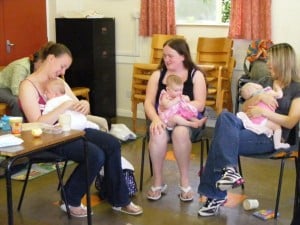Mothers need support with breastfeeding all year around, but National Breastfeeding Celebration Week (NBCW) aims to raise awareness of its significance for the health and wellbeing of mothers and babies, as well as for long-term public health outcomes. It offers mothers, breastfeeding supporters and health professionals an opportunity to share their thoughts and ideas on how to support breastfeeding in local communities.
This year, National Breastfeeding Celebration Week is concentrating on how ‘everyone in local communities can support mothers to breastfeed, whenever and wherever they are’.1
Timely support can make all the difference
If women receive support – whether it be from a friend or family member, a health professional, or volunteer breastfeeding supporter – they are likely to breastfeed for longer.2 Breastfeeding is not always easy at first and new mothers can feel overwhelmed and lose confidence. Having someone to turn to who can offer support, words of encouragement and help deflect negative comments can make all the difference.
Support from family and friends
Some of the things which mothers have found really helpful, particularly in the early days are:
- Being “mothered” themselves, with partners or family members making sure they could sit and breastfeeding in comfort with the things they needed to hand, such as a cup of tea, the TV remote or enough cushions.
- Fending off visitors, or those who stayed too long, and having guests who didn’t mind seeing the mother in her dressing gown and who offered to make a cup of tea or help in some other way.
- Partners and family spending time with other children so they did not feel left out, and giving the mother a chance to have one-to-one time getting to know the baby, or to sleep a bit longer.
- Giving mum a chance to rest by doing other things with the baby such as changing nappies or carrying him/her around.
Boosting confidence
Having supportive partners, friends or family can be so important when things are not going smoothly. When things seem difficult, having a partner or family member who tells you that you are doing a great job, who doesn’t suggest that you stop breastfeeding, but tells you that you can do it and defends your choices against the criticism of others makes a big difference.
One new mother says: “My husband and family have been wonderful and encouraged me to continue. My husband tells me several times a day how well I am doing. I need that!”
This is just as important as the baby gets older and women can feel increasingly judged.
When her child was 15 months old, Lorna said: ‘My partner told me: “I don’t think there is anything more lovely than seeing a mother breastfeeding her baby. It looks so natural.”
Ruth’s daughter was 18 months old when she was sitting on the sofa between two great-aunts and she wanted to breastfeed. “My great- aunts were in their eighties, and I wondered what they would say. They were very positive: “Oh, well done! That’s brilliant. Keep it up!” Then they started telling stories about when they had breastfed.”
See more mothers’ stories here:
https://laleche.org.uk/mothers-on-support-from-our-nearest-and-dearest/
Finding Your People
La Leche League Great Britain (LLLGB) has been offering mother-to-mother support in GB for almost 45 years. LLL Leaders are mothers who have themselves breastfed for 12 months or longer and undergone an accreditation process. They know that breastfeeding is not always easy and how much difference having someone to talk to can make.
Jane says: “When my baby was six months I messaged a local Leader for info because all my friends had stopped breastfeeding before six months and were saying there wasn’t enough iron in breast milk. I discovered this was not correct; I carried on breastfeeding and got good information that made me happy that I didn’t stop. Now I have another child I am much more confident about the whole process.”
When Rebecca’s second son was born early he had to spend three weeks in the Special Care Unit. Rebecca says that support from LLL gave her the confidence to encourage him to nurse and spend time having skin-to-skin contact.
You can read Rebecca’s story here:
https://laleche.org.uk/mothering-through-special-care/
Breastfeeding started well for Vicky, but once at home she developed nipple trauma and mastitis and went through several difficult weeks. She says two things got her through, the support of her husband and finding La Leche League. LLL gave her information and support and the confidence to realise what was right for her and her baby. Vicky says she came to LLL for breastfeeding support, but continued to go along to her group as she found support for mothering as her baby grew.
You can read Vicky’s story here:
https://laleche.org.uk/finding-my-people/
Find LLLGB during NBCW
During National Breastfeeding Week, La Leche League GB’s Facebook page LLLGB Because Breastfeeding Matters will be posting positive messages and images about breastfeeding and we will be tweeting @LLLGB. Visit our page to share and comment or follow us on Twitter @lllgb. Many of our LLL groups also have their own local page on Facebook.
LLLGB’s national telephone helpline (0845 120 2918) connects mothers directly to an accredited Leader, while our website includes an online help form that enables a mother to receive email help from an LLL Leader. All our Leaders are volunteers and answer calls from home while looking after their families. Leaders provide telephone counselling, email support and local group meetings, with leaflets on a wide range of breastfeeding questions, information on more unusual situations, access to a panel of professional advisors, and books covering various aspects of pregnancy and child care.
2 Dr Sue Battersby, An Evaluation of La Leche League GB’s Breastfeeding Peer Counsellor Programme, 2007
Find your local LLL group
Support from LLLGB
Supporting a breastfeeding mother


